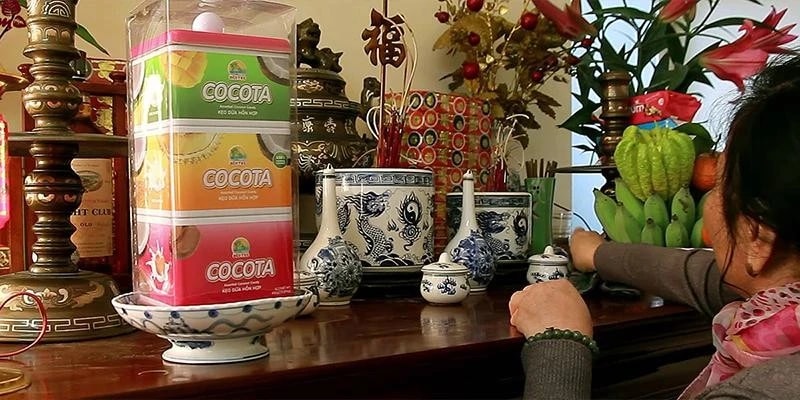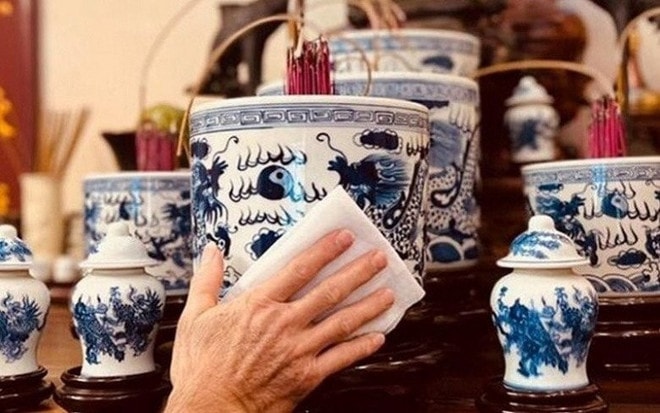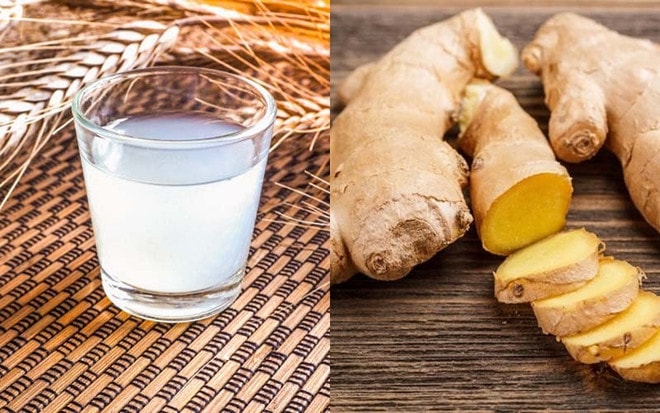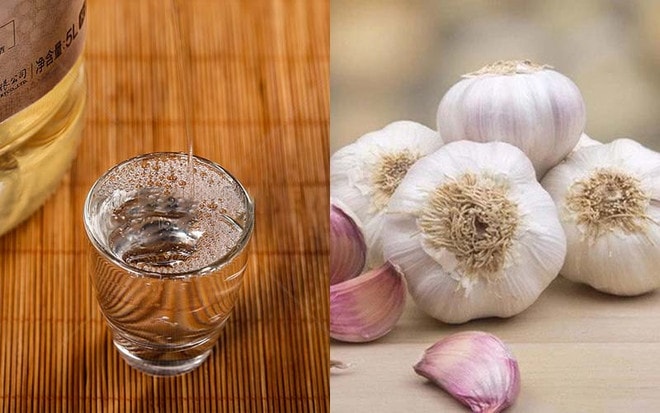Many people think that plain water is a convenient and easy option to clean the altar, but in fact, this is not recommended for the following reasons.

The altar is a sacred space in every Vietnamese family, a place to show respect to ancestors, gods and deities in folk beliefs. This is the place to perform rituals, worship, and is a bridge between the human world and the spiritual world.
Keeping the altar clean and solemn is not only an act of respect but also shows understanding and seriousness in worship culture.
One of the questions that is often asked is whether we should use plain water (tap water) to clean the altar?
Many people think that plain water is a convenient and easy option, but in reality, this is not recommended. Here are some reasons why we should not use plain water to clean the altar.
In the culture of worship, the altar is not just an object in the house but also a place associated with sacred rituals. Therefore, using water to clean the altar can be considered disrespectful.
Plain water is water that has not been specially treated, is simple and ordinary, and cannot create solemnity like carefully prepared worship water.

Worship water is often made from clean water, adding ingredients such as flowers, aromatic leaves, or herbs to create a pure and clean space.
When wiping the altar with plain water, many people will feel that the sacred atmosphere and solemnity of the altar are reduced. This also reflects a lack of care and attention to the worship space, which needs to be carefully preserved to show respect.
Although tap water is water taken directly from sources such as wells, lakes, rivers or tap water, tap water is not always clean and safe.
Untreated water can contain many impurities, bacteria or harmful microorganisms. When you use plain water to clean the altar, you will inadvertently clean the altar with water that can cause pollution.
This not only affects the cleanliness of the altar but can also damage worship items, especially wooden, copper, or ceramic objects.
In worship rituals, the purity of the space is an important factor that helps the homeowner easily connect with ancestors and gods.
Plain water, which is ordinary in nature, cannot create a pure and fresh space like water made from flowers, leaves or herbs.
Usually when cleaning the altar, people will use perfume or water mixed with fragrant herbs, such as grapefruit flower water, mugwort water, or jasmine water. These types of water not only have a cleaning effect but also help to purify, creating a prosperous, auspicious atmosphere.
Many people believe that cleaning the altar is not only a physical act but also an act that brings luck and peace to the family.
Using plain water can bring a feeling of irreverence, reducing the solemnity of the worship space, thereby negatively affecting the homeowner's psychology.
When people do not pay attention to choosing the right water for worship, their souls will become restless, lack respect for their ancestors, and easily become distracted and unfocused during worship rituals.
In the Vietnamese worship tradition, the care and selection of worship objects and materials are very important. Every action on the altar has a profound meaning. Therefore, using plain water to clean the altar is not only unaesthetic but also goes against traditional rules and customs.
According to feng shui, the water used to clean the altar must be clean and pure, it can be water washed from leaves or water mixed with flowers and grass, helping to purify the space, avoid bad luck, and bring fortune to the family.
1. Ginger wine
Wine and ginger are warm and effective in removing odors. Just crush 1-2 ginger roots, add them to wine and you will have a standard altar cleaning solution.
Wiping the altar with this water helps remove dirt and stains that have been on the altar for a long time.
Not only that, using wine and ginger to clean the altar also helpsAttract wealth and luck because ancient people believed that wine and ginger could ward off evil spirits, bad luck, and bring wealth and luck to the house.

2. Garlic wine water
Like wine mixed with ginger, wine mixed with garlic is an option you should consider to clean the altar at the end of the year.
Garlic has long been known to ward off evil spirits. Using garlic mixed with wine will help your home have a new breath of life.
Garlic and alcohol are easy to find. When combined, you will have a cleaning mixture that helps remove stubborn stains and old stains on the altar and incense burner, thereby giving the altar a fresh, clean space.
The way to use is very simple, just peel the garlic and then soak it in alcohol for about 7-10 days and then you can take it out to clean the altar. If you don't have much time, you can crush the garlic and then put it in alcohol and you can use it immediately.

3. Five-spice water
Five-spice water, also known as fragrant water or bao sai, has the heat from medicinal herbs, so it is considered the best water for cleaning the altar on Tet holiday.
The water contains 5 different spices such as cloves, cinnamon, star anise, eucalyptus, and sandalwood.
In folk medicine, herbs have the effect of repelling evil spirits. In addition, their scent is also very pleasant and helps repel insects effectively.
The method is very simple, just boil about 1.5 liters of filtered water, then add 5 herbs and cook for about 3-5 minutes, then turn off the stove. Use a clean towel dipped in water and clean the altar.
PV (synthesis)